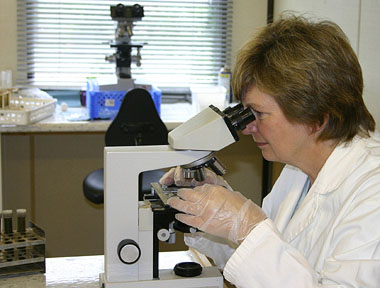Pfizer And Westgate Help Horse Owners Understand Faecal Worm Egg Counts
 12 years ago
12 years ago  2404 views
2404 views
Posted
28th May, 2012 14h42
 The worming experts at Pfizer Animal Health and Westgate Laboratories have combined their expertise to help horse owners understand why Faecal Worm Egg Counts (FWECs) are one of the most important tools to help with summer worm control.
David Booth at Westgate explains: “A Faecal Worm Egg Count simply involves collecting a sample of fresh dung and sending it, in the special packaging provided, to a specialist laboratory. There it will be analysed and the number of worm eggs in the sample will be measured and reported back to you as eggs per gram. Results and worming can then be discussed with an experienced animal health advisor.”
Ben Lacey at Pfizer continues: “FWECs are invaluable during the grazing season as they will indicate how many eggs each horse is contributing to the contamination of your pasture. Eggs hatch into worm larvae, so the higher the egg count the more larvae will be on the grazing - increasing the risks of re-infecting all the horses with worms.”
Conducting regular FWECs can help you to target your worming treatments by only dosing horses with a significant worm burden, which will stop them from re-infecting the pasture for a period after the treatment. The horses with low egg counts are less likely to need a treatment as they are not contributing as many new worms onto the pasture. The test can also give you an indication of whether your wormer is working, if you take a FWEC before and after administering a wormer.
Ben Lacey at Pfizer concludes: “It is essential to remember though that a standard FWEC will not give a clear indication of tapeworm, encysted small redworm or bots. For these you will need to use a proven wormer on a strategic basis – usually in the autumn and spring for tapeworm and late autumn/early winter for encysted small redworm.”
For further information check out Pfizer Animal Health’s new website www.wormingyourhorse.info which includes a comprehensive section on FWECs, visit www.westgatelabe.co.uk or speak to your vet or Animal Health Advisor.
The worming experts at Pfizer Animal Health and Westgate Laboratories have combined their expertise to help horse owners understand why Faecal Worm Egg Counts (FWECs) are one of the most important tools to help with summer worm control.
David Booth at Westgate explains: “A Faecal Worm Egg Count simply involves collecting a sample of fresh dung and sending it, in the special packaging provided, to a specialist laboratory. There it will be analysed and the number of worm eggs in the sample will be measured and reported back to you as eggs per gram. Results and worming can then be discussed with an experienced animal health advisor.”
Ben Lacey at Pfizer continues: “FWECs are invaluable during the grazing season as they will indicate how many eggs each horse is contributing to the contamination of your pasture. Eggs hatch into worm larvae, so the higher the egg count the more larvae will be on the grazing - increasing the risks of re-infecting all the horses with worms.”
Conducting regular FWECs can help you to target your worming treatments by only dosing horses with a significant worm burden, which will stop them from re-infecting the pasture for a period after the treatment. The horses with low egg counts are less likely to need a treatment as they are not contributing as many new worms onto the pasture. The test can also give you an indication of whether your wormer is working, if you take a FWEC before and after administering a wormer.
Ben Lacey at Pfizer concludes: “It is essential to remember though that a standard FWEC will not give a clear indication of tapeworm, encysted small redworm or bots. For these you will need to use a proven wormer on a strategic basis – usually in the autumn and spring for tapeworm and late autumn/early winter for encysted small redworm.”
For further information check out Pfizer Animal Health’s new website www.wormingyourhorse.info which includes a comprehensive section on FWECs, visit www.westgatelabe.co.uk or speak to your vet or Animal Health Advisor.More from
- IVC Evidensia assembles expert team to run new £10m referral hospital
- Home delivery service can increase pet health plan sign-ups by 25%
- Research reveals vital clues to help fight anthelmintic resistance
- Lifetime Achievement Award recognises Harrogate vet’s dedication to improving the health and welfare of rabbits
- Bake sale at Leicestershire vet practice for good cause


 19 hours ago
19 hours ago